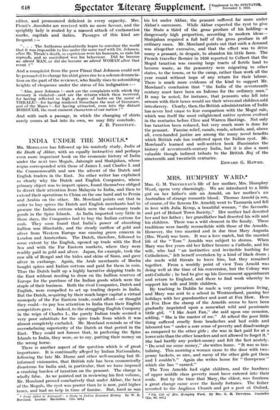INDIA UNDER THE MOGULS.*
MR. MORELAND has followed up his masterly study, India at She Death of Akbar, with an equally instructive and perhaps even more important book on the economic history of India under the next two Moguls, Jahangir and Shahjahan, whose reigns corresponded with those of James I. and Charles I. and the Commonwealth and saw the advent of the Dutch and English traders in the East. No other writer has explained so clearly why the Dutch and English Companies, whose primary object was to import spices, found themselves obliged to divert their attention from Malaysia to India, and then to extend their operations to China on the one hand and to Persia and Arabia on the other. Mr. Moreland points out that in order to buy spices the Dutch and English merchants had to procure the Indian cottons which were the customary trade goods in the Spice Islands. As India imported very little in those days, the Companies had to buy the Indian cottons for cash. They soon found that India's power of absorbing bullion was illimitable, and the steady outflow of gold and silver from Western Europe was causing grave concern in London and Amsterdam. The Dutch, therefore, followed to some extent by the English, opened up trade with the Red Sea and with the Far Eastern markets, where they were readily paid in gold and silver. Japan, for example, took the raw silk of Bengal and the hides and skins of Siam, and gave silver in exchange. Again, the Arab merchants of Mocha bought spices and Indian cottons and paid for them in coin. Thus the Dutch built up a highly lucrative shipping trade in the East without needing to draw on the bullion reserves of Europe for the purchase of the Indian goods which were the staple of their business. Both the rival Companies, Dutch and English, were compelled to set up trading depots in India. But the Dutch, acquiring by their much larger capital a virtual monopoly of the Far Eastern trade, could afford—or thought they could—to pay less attention to India than their English competitors gave. Indeed, to the struggling English Company in the reign of Charles I., the purely Indian trade seemed a very poor substitute for the spice trade from which it was almost completely excluded. Mr. Moreland reminds us of the overwhelming superiority of the Dutch at that period in the East. They could not foresee that, in preferring the Spice Islands to India, they were, so to say, putting their money on the wrong horse.
There is another aspect of the question which is of great importance. It is continually alleged by Indian Nationalists, following the late Mr. Hume and other well-meaning but ill- informed visionaries, that British rule has been economically disastrous for India arid, in particular, that we have imposed a crushing burden of taxation on the peasant. The charge is wholly false. As we pointed out in reviewing his first volume, Mr. Moreland proved conclusively that under Akbar, the best of the Moguls, the ryot was poorer than he is now, paid higher taxes, and had no help in time of famine. But, hard as was
• From Akbar to Aurungreb : a Study in Indian Economic Hietory. By W. H. Moreland. Loudon: Macmillan. 1158. net.]
his lot under Akbar, the peasant suffered far more under Akbar's successors. While Akbar expected the ryot to give the State a third of the gross produce of his holding—a dangerously high proportion, according to modern ideas- Shahjahan required a full half of the gross produce in all
ordinary cases. Mr. Moreland points out that such a demand was altogether excessive, and that the effect was to drive many a peasant, in despair, to abandon his little farm. The French traveller Bernier in 1656 reported to Colbert that the Mogul taxation was causing large tracts of fertile land to become waste, as the peasantry were migrating to other states, to the towns, or to the camp, rather than work all the year round without hope of any return for their labour. There is much more evidence of the kind to support Mr. Moreland's conclusion that "the India of the seventeenth century must have been an Inferno for the ordinary man." It may be noted, for instance, that peasants who fell into arrears with their taxes would see their wives and children sold into slavery. Clearly, then, the British administration of India has never had cause to fear comparison with the Mogul rule, which was itself the most enlightened native system evolved in the centuries before Clive and Warren Hastings. Not only has taxation been reduced, but very much more is done for the peasant. Famine relief, canals, roads, schools, and, above all, even-handed justice are among the many novel benefits which British rule has conferred upon the Indian ryot. Mr. Moreland's learned and well-written book illuminates the history of seventeenth-century India, but it is also a most valuable though indirect tribute to the British Raj of the nineteenth and twentieth centuries.
EDWARD G. HAWKE.


























































 Previous page
Previous page